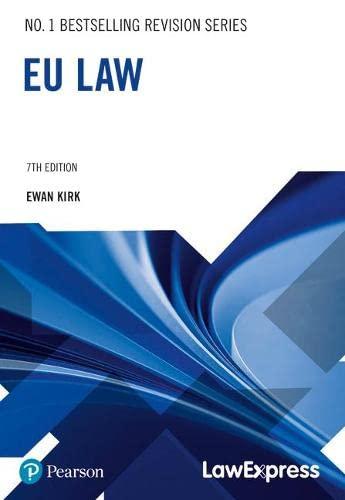Question
QUESTION 1. According to the law of torts, in strict liability there is the rule of Ryland's verses fletcher which generally emphases on liability without
QUESTION
1. According to the law of torts, in strict liability there is the rule of Ryland's verses fletcher
which generally emphases on liability without fault. In reference to the above statement,
discuss the requirements of the rule in Rylands verses fletcher.
2. In the law of torts, strict liability generally refers to the emphasis placed by courts on fault-
based liability that is liability without fault which is applicable in various ways which are
evident by law. Discuss the requirements for strict liability to be applicable.
3. Negligence is an example of law of tort which refers to where a person owes legal duty of
care to another, breaches that causing the person loss or damages. In references to so, discuss
the defenses in negligence.
4. Nuisance is a tort committed whenever a person is wrongfully disturbed in the use and
enjoyment of his land as it arises from the duties owed by neighboring occupiers of land.
State and explain the types of nuisance.
5. With reference to the law of tort, there is nuisance which focuses on wrong committed if
someone is denied or disturbed in the enjoyment and use of his land. Discuss the defenses in
nuisance.
6. Trespass to land occurs whenever a person's(plaintiff) possession is wrongfully interfered
with, whereby possession and not necessarily ownership and as such the plaintiff can be the
owner or the tenant. Highlight the remedies to trespass in land.
7. False imprisonment occurs when a person is deprived of their freedom without legal
explanation such as locking someone in a room. Therefore, highlight the main ingredients of
the tort and its rules.
8. Battery is the actual use of force towards another person without lawful justification e. g.
hitting a person and it is only actionable if it is voluntary or intentional which are guided by
rules and should be abided by. State the rules of battery.
9. Slander is a kind of defamation which is actionable upon proof of damage which is a non-
permanent form usually by word of mouth. Therefore, discuss the cases of slander that are
actionable per se.
10. Occupiers' liability generally refers to the duty owed by land/premise owners to those who
come onto their land and the law relating to it has distinct English origin. With reference to
so, discuss the expectations of the occupier.
Step by Step Solution
There are 3 Steps involved in it
Step: 1

Get Instant Access to Expert-Tailored Solutions
See step-by-step solutions with expert insights and AI powered tools for academic success
Step: 2

Step: 3

Ace Your Homework with AI
Get the answers you need in no time with our AI-driven, step-by-step assistance
Get Started


